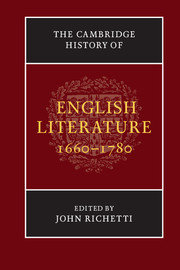Book contents
- Frontmatter
- Introduction
- PART I LITERARY PRODUCTION AND DISSEMINATION: CHANGING AUDIENCES AND EMERGING MEDIA
- 1 Publishing and bookselling 1660–1780
- 2 The social world of authorship 1660–1714
- 3 Popular entertainment and instruction, literary and dramatic: chapbooks, advice books, almanacs, ballads, farces, pantomimes, prints and shows
- 4 Novels on the market
- PART II LITERARY GENRES: ADAPTATION AND REFORMATION
- PART III LITERATURE AND INTELLECTUAL LIFE: THE PRODUCTION AND TRANSMISSION OF CULTURE
- PART IV LITERATURE AND SOCIAL AND INSTITUTIONAL CHANGE
- PART V LITERARY GENRES: TRANSFORMATION AND NEW FORMS OF EXPRESSIVENESS
- PART VI CONCLUSION
- Chronology
- Bibliographies
- Index
- References
2 - The social world of authorship 1660–1714
from PART I - LITERARY PRODUCTION AND DISSEMINATION: CHANGING AUDIENCES AND EMERGING MEDIA
Published online by Cambridge University Press: 28 March 2008
- Frontmatter
- Introduction
- PART I LITERARY PRODUCTION AND DISSEMINATION: CHANGING AUDIENCES AND EMERGING MEDIA
- 1 Publishing and bookselling 1660–1780
- 2 The social world of authorship 1660–1714
- 3 Popular entertainment and instruction, literary and dramatic: chapbooks, advice books, almanacs, ballads, farces, pantomimes, prints and shows
- 4 Novels on the market
- PART II LITERARY GENRES: ADAPTATION AND REFORMATION
- PART III LITERATURE AND INTELLECTUAL LIFE: THE PRODUCTION AND TRANSMISSION OF CULTURE
- PART IV LITERATURE AND SOCIAL AND INSTITUTIONAL CHANGE
- PART V LITERARY GENRES: TRANSFORMATION AND NEW FORMS OF EXPRESSIVENESS
- PART VI CONCLUSION
- Chronology
- Bibliographies
- Index
- References
Summary
The period from 1660 to 1714 witnessed what might be called the birth of the modern English author. For it is during these years that there began to appear many of the features by which we define modern authorship: copyright legislation, widespread identification of the author on the title page, the ‘author by profession’, bookselling as a commercial enterprise, a literary ‘marketplace’, the periodical essay and political journalism. But it is important not to assume that the practice of authorship c. 1700 closely resembled the practice of authorship today, or even in 1800. Far from being an ‘independent’ man of letters, reflecting a highly individual sensibility, the typical author in the late seventeenth and early eighteenth centuries was enmeshed in an intricate web of social and political connections that not only defined a writer's working life but defined literary production itself. Most writing of the period was ‘occasional’ – prompted by some public event or controversy in the politics of church or state or the world of letters. Many writers in the early part of the period were aligned with a powerful courtier or minister – the Duke of Buckingham, the Duke of York, the Earl of Shaftesbury, the Duke of Monmouth, the Earl of Rochester – or hoped to be, so that they could attract the attention and encouragement of a patron. Even at the end of the period many writers attached themselves to Whig and Tory ministers, Lord Somers, Robert Harley, or the Earl of Halifax. Even those who did not take part in high politics were enmeshed in dense private networks.
- Type
- Chapter
- Information
- The Cambridge History of English Literature, 1660–1780 , pp. 37 - 60Publisher: Cambridge University PressPrint publication year: 2005
References
- 5
- Cited by



